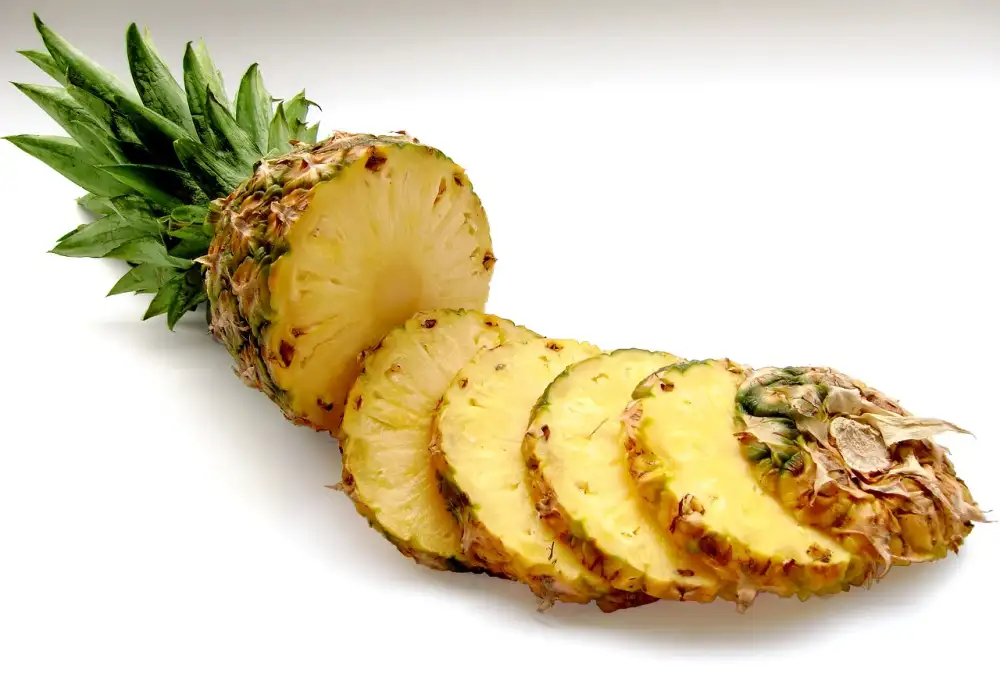Unveiling the Mystery: Why Does Pineapple Cause Mouth Discomfort? Discover the Surprising Reasons in this Health Guide

- The science behind pineapple's mouth irritation
- Enzymes in pineapple: The culprit behind the discomfort
- Bromelain: The enzyme responsible for pineapple's mouth irritation
- How bromelain affects the mouth and taste buds
- Factors that influence the intensity of mouth discomfort from pineapple
- Managing pineapple-induced mouth discomfort
- Tips for enjoying pineapple without discomfort
Pineapple, with its tropical sweetness and vibrant flavor, is a beloved fruit enjoyed by many. However, for some individuals, eating pineapple can lead to an uncomfortable sensation in the mouth. This mysterious phenomenon has puzzled pineapple enthusiasts for years. In this health guide, we will delve into the science behind why pineapple causes mouth discomfort and uncover the surprising reasons behind this peculiar reaction. So, if you've ever wondered why your love for pineapple comes with a side of discomfort, read on to unravel the mystery and gain a deeper understanding of this unique culinary experience.
The science behind pineapple's mouth irritation
The science behind pineapple's mouth irritation lies in the enzymes present in this tropical fruit. Pineapple contains a group of enzymes called bromelain, which can cause discomfort when consumed. These enzymes break down proteins and can lead to a tingling or burning sensation in the mouth. Understanding the role of bromelain is crucial in unraveling the mystery of why some people experience mouth discomfort after eating pineapple.
Enzymes in pineapple: The culprit behind the discomfort
Enzymes in pineapple, specifically bromelain, are the main culprits behind the discomfort experienced when consuming this tropical fruit. Bromelain is a mixture of enzymes that break down proteins, and it is highly concentrated in the core and stem of the pineapple. When we eat pineapple, these enzymes come into contact with our mouth tissues, causing irritation and a tingling sensation. Understanding the role of enzymes in pineapple is crucial to unraveling the mystery behind this mouth discomfort.
Bromelain: The enzyme responsible for pineapple's mouth irritation
Bromelain, an enzyme found in pineapple, is the primary culprit behind the mouth irritation experienced by some individuals. This powerful enzyme breaks down proteins and can cause a tingling or stinging sensation in the mouth when it comes into contact with delicate tissues. While bromelain offers numerous health benefits, its presence in pineapple can be problematic for those sensitive to its effects. Understanding bromelain's role in pineapple-induced mouth discomfort is key to managing and enjoying this tropical fruit without any unpleasant side effects.
How bromelain affects the mouth and taste buds
Bromelain, the enzyme found in pineapple, is responsible for the mouth irritation experienced by some individuals. When bromelain comes into contact with proteins in the mouth, it breaks them down and causes a tingling or burning sensation. This reaction can also affect the taste buds, altering the perception of flavors. The intensity of this effect varies from person to person and can range from mild discomfort to more pronounced irritation. Understanding how bromelain affects the mouth and taste buds is crucial in managing pineapple-induced discomfort.
Factors that influence the intensity of mouth discomfort from pineapple
Factors such as the ripeness of the pineapple, individual sensitivity to bromelain, and the way pineapple is prepared can all influence the intensity of mouth discomfort. Riper pineapples tend to have higher levels of bromelain, leading to more pronounced irritation. Additionally, some individuals may be more sensitive to bromelain than others, experiencing stronger reactions. The method of preparation, such as juicing or cooking the pineapple, can also affect the concentration of bromelain and therefore the level of discomfort experienced.
Managing pineapple-induced mouth discomfort
Managing pineapple-induced mouth discomfort can be a challenge, but there are a few strategies that can help alleviate the discomfort. One approach is to cook or heat the pineapple before consuming it. This can help break down the enzymes responsible for the irritation. Another option is to pair pineapple with other foods that can counteract its effects, such as dairy products like yogurt or milk. Chewing on mint leaves or drinking mint tea can also provide relief by soothing the irritated taste buds. Lastly, if the discomfort persists, it may be best to avoid consuming pineapple altogether or limit its consumption to small amounts. By taking these steps, you can still enjoy the unique and delicious flavor of pineapple without experiencing excessive mouth discomfort.
Tips for enjoying pineapple without discomfort
1. Pair pineapple with other foods: Combining pineapple with other fruits or savory ingredients can help balance out the enzymes and reduce mouth discomfort. Try adding pineapple to a fruit salad or incorporating it into a salsa with tomatoes and onions.
2. Opt for ripe pineapples: Ripe pineapples have lower levels of bromelain, making them less likely to cause mouth irritation. Look for pineapples that are golden in color and give off a sweet aroma.
3. Cook or grill pineapple: Heating pineapple can help break down the enzymes responsible for mouth discomfort. Grilling or lightly cooking pineapple can make it more enjoyable to eat.
4. Drink water after eating pineapple: Swishing water around your mouth after consuming pineapple can help neutralize the enzymes and alleviate any lingering discomfort.
5. Freeze or blend pineapple: Freezing or blending pineapple can also reduce the impact of bromelain on your taste buds. Enjoying frozen chunks of pineapple or incorporating it into smoothies can be a refreshing way to indulge without the discomfort.
By following these tips, you can still enjoy the unique flavor and health benefits of pineapple while minimizing any potential mouth discomfort.
While it's true that pineapple can cause mouth discomfort for some people, it's important to remember that this tropical fruit also offers numerous health benefits and a unique flavor profile. Rather than avoiding pineapple altogether, understanding the science behind its mouth irritation can help us appreciate it even more. By being mindful of factors like ripeness, preparation methods, and portion sizes, we can enjoy this delicious fruit without experiencing excessive discomfort. So let's embrace the love-hate relationship with pineapple and continue to explore its culinary possibilities with passion and curiosity.
Published: 11. 12. 2023
Category: Health



